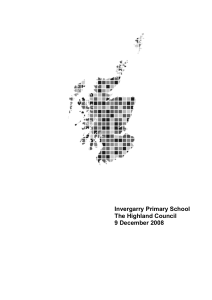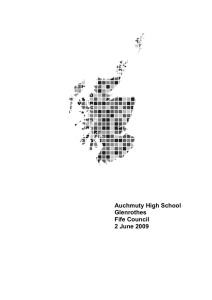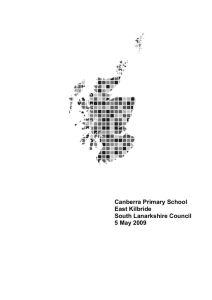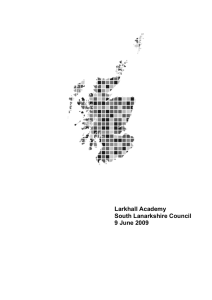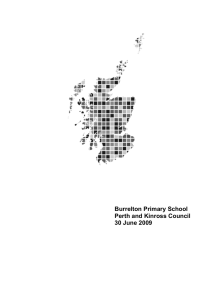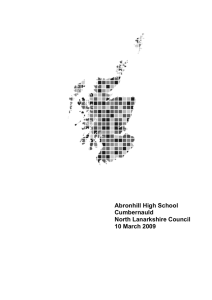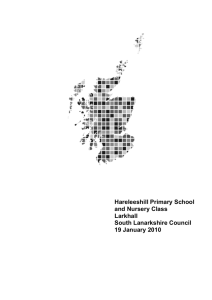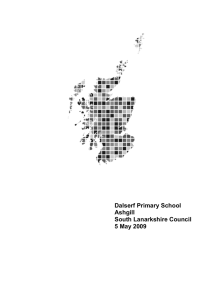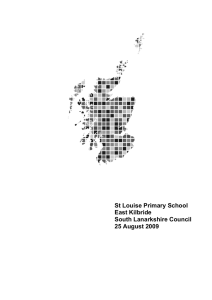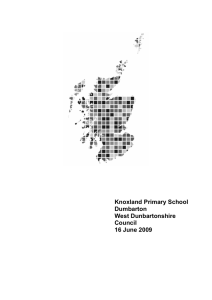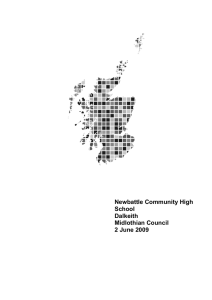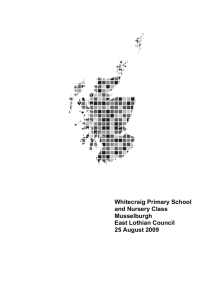Banff Primary School Aberdeenshire Council 9 December 2008
advertisement
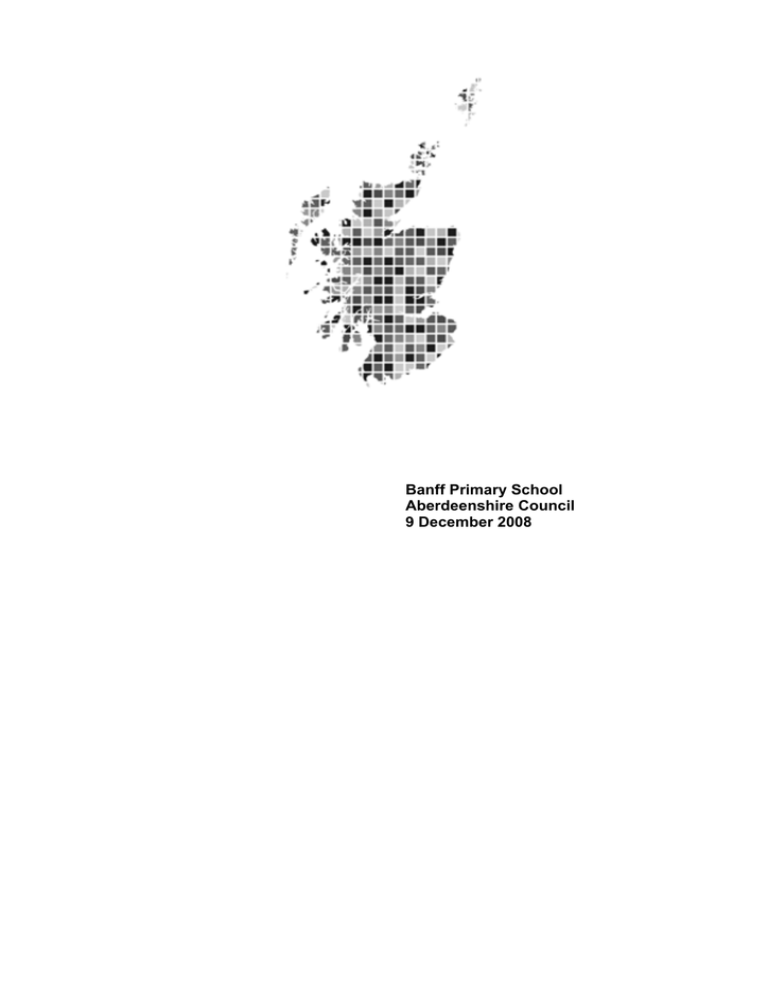
Banff Primary School Aberdeenshire Council 9 December 2008 We published a report on Banff Primary School in December 2006. That report set out key strengths of the school and main points for action. We carried out a follow-through inspection in October 2007 and published a report on this visit in January 2008. This follow-through report is based on an inspection visit which was carried out in September 2008. It tells you about improvements since the original inspection in the quality of education which the school provides. It also comments on how the school is getting on with the main points for action. First we focus on changes in the core work of the school. We explain how the school has got better at helping children to learn and benefit from being at the school. Next we look at the key processes which enable this to happen, including the involvement of parents 1 . Our report also describes developments in the ‘ethos’ of the school, by which we mean how well children are cared for and how much is expected of them in all aspects of school life. Finally we comment on improvements in leadership to help the school achieve its aims. 1 Throughout this report, the term ‘parents’ should be taken to include foster carers, residential care staff and carers who are relatives or friends. Contents 1. The school 2. Particular strengths of the school 3. Examples of good practice 4. How well do children learn and achieve? 5. How well do staff work with others to support children's learning? 6. Are staff and children actively involved in improving their school community? 7. Does the school have high expectations of all children? 8. Does the school have a clear sense of direction? 9. What happens next? 1. The school Banff Primary School serves the town of Banff in Aberdeenshire. There has been an increase in the roll and a number of staffing changes have taken place since the original inspection. 1 2. Particular strengths of the school • The positive atmosphere in the school. • Improvements to the support given to parents and children moving from nursery to P1. • Improved partnerships with parents, the community and other agencies. • Enterprise education and its impact on children’s confidence. • Improvements to learning and teaching approaches. 3. Examples of good practice • Enterprise education across the school. • Arrangements to support children with autism. You can find out more about these examples of good practice at www.hmie.gov.uk. 4. How well do children learn and achieve? Children are confident and most are making good progress. They are keen to learn and enjoy their lessons. They answer questions confidently and share their ideas with others in group activities. Teachers now provide a wider range of learning experiences. They make better use of the school grounds and local area to broaden 2 children’s learning. They use technology such as computers and more practical activities to help children learn. Children worked well together in groups and in pairs. There have been big improvements in the quality of teaching in English language and mathematics. Overall, children are achieving well in these subjects and most have a better idea of what they need to do to improve. At P1 and P2 children are benefiting from taking part in stimulating learning activities. They regularly learn through ‘active play’ sessions. Teachers give pupils tasks and activities in reading, writing and mathematics which are more often at the right level of difficulty. They are beginning to make links between other curriculum areas. Teachers involve children more in planning their own learning activities. Attainment in English language and mathematics has improved since the original inspection took place. Children, supported by the school, have achieved successes in a wide range of sporting and cultural events. All children take part in enterprising projects which help them to learn about the world of work. 5. How well do staff work with others to improve children's learning? Teamwork among staff is strong. Support staff now have clearer remits and areas of responsibility. They and visiting staff are providing more effective support for children. The support for learning teachers give class teachers and support staff useful advice and practical help to meet the needs of all children. The two depute headteachers and staff have worked well together to improve children’s learning. As part of this improvement classroom assistants now work more effectively in classes, alongside teachers to work directly with children. Staff from other council services and outside organisations provide high quality additional support. Parents are more involved in school activities. The Parent Council and individual parents continue to help with educational visits and some are members of the Eco committee. Homework tasks are becoming more interesting and varied. 3 6. Are staff and children actively involved in improving their school community? Children play an active part in improving the school community. Through the pupil council, Eco committee, as playground buddies and as friends to younger children in P1 many children have a say in how to make the school better. They talk positively about the changes to learning in mathematics lessons. They prefer to learn actively and spend less time on written exercises. Several took part in a working lunch with local businesses. Overall, the children are developing very well as citizens. Children, parents and staff together support a wide range of charities. These include UNICEF and Barnardo’s. Children visited a local home for the elderly and took them decorated plant pots. A notable feature has been the highly successful way in which children have worked with an author to write their own history book about Banff. Staff are more involved in improving the work of the school. Almost all staff are members of working groups which develop aspects of the curriculum and focus on improving children’s learning experiences. Staff find this type of work rewarding. 7. Does the school have high expectations of all children? There has been a noticeable rise in the expectations all staff have of standards of children’s attainment. Children respond well to these increased expectations. They are now much more confident in the way that they approach their learning. Teachers make better use of praise to reward children’s achievements and to motivate children as learners. Surveys completed by parents and children show they are more satisfied with the work of the school. In particular, parents of children starting school in August were very happy with the support they and their children received as they moved from nursery to P1. Regular assemblies celebrate children’s successes and achievements. 4 8. Does the school have a clear sense of direction? With a very good lead from the headteacher, ably supported by the two depute headteachers and staff, there is a much improved sense of direction. Plans for improvement are better thought out and a clear set of priorities are now in place. All staff are working hard to address these priorities and provide a better education for the children. Parents and children are much more positive and optimistic about the school’s future. The education authority has provided relevant support and the school now performs well. Overall, Banff Primary School shows a strong capacity to continue to improve. 9. What happens next? There is clear evidence of improvement since the original inspection in September 2006. The school now performs well overall. With continued strong leadership, commitment of staff and support from the education authority the school is well placed to continue to improve. The quality of leadership and of learning have improved and are now at a satisfactory level or better. We will make no further visits in connection with the original inspection. HM Inspector: Marion Burns 9 December 2008 5 To find out more about inspections or get an electronic copy of this report go to www.hmie.gov.uk. Please contact the Business Management and Communications Team (BMCT) if you wish to enquire about our arrangements for translated or other appropriate versions. If you wish to comment about any of our inspections, contact us at HMIEenquiries@hmie.gsi.gov.uk or alternatively you should write in the first instance to BMCT, HM Inspectorate of Education, Denholm House, Almondvale Business Park, Almondvale Way, Livingston EH54 6GA. Our complaints procedure is available from our website www.hmie.gov.uk or alternatively you can write to our Complaints Manager, at the address above or by telephoning 01506 600259. If you are not satisfied with the action we have taken at the end of our complaints procedure, you can raise your complaint with the Scottish Public Services Ombudsman (SPSO). The SPSO is fully independent and has powers to investigate complaints about Government departments and agencies. You should write to the SPSO, Freepost EH641, Edinburgh EH3 0BR. You can also telephone 0800 377 7330, fax 0800 377 7331 or e-mail: ask@spso.org.uk. More information about the Ombudsman’s office can be obtained from the website at www.spso.org.uk. Crown Copyright 2008 HM Inspectorate of Education
